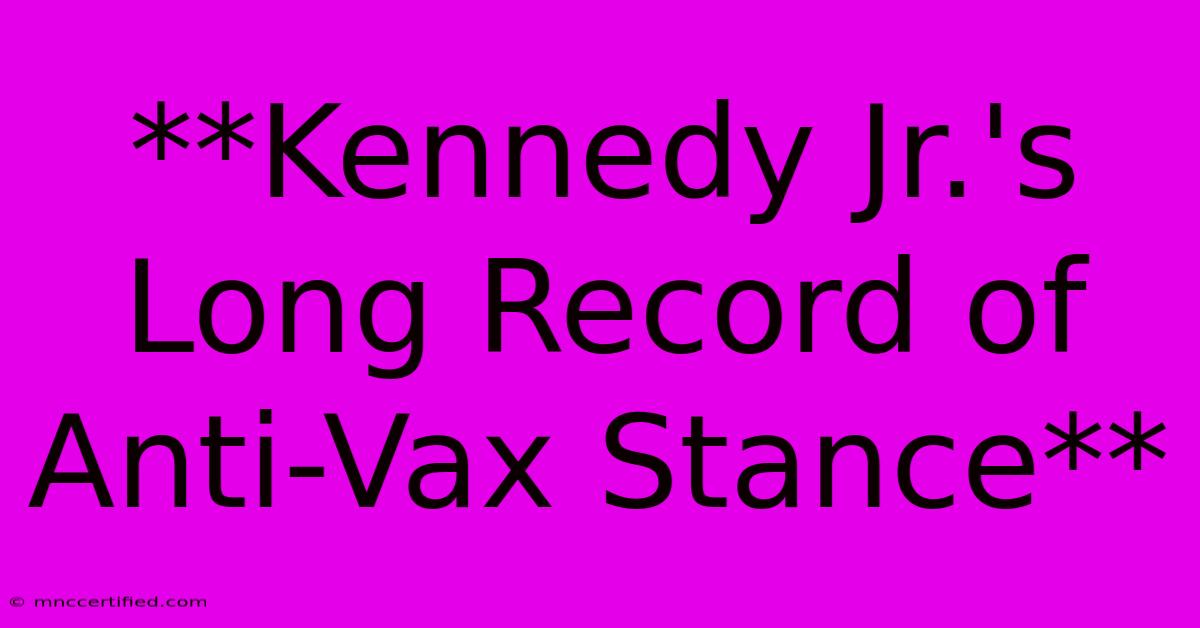**Kennedy Jr.'s Long Record Of Anti-Vax Stance**

Table of Contents
Kennedy Jr.'s Long Record of Anti-Vax Stance: A History of Misinformation
Robert F. Kennedy Jr., a prominent environmental activist and member of the Kennedy family, has become a leading voice in the anti-vaccine movement. His long-standing opposition to vaccines has generated significant controversy, with critics accusing him of spreading misinformation and endangering public health. This article explores the history of Kennedy Jr.'s anti-vaccine stance, examining the key arguments he advances and the scientific evidence that contradicts his claims.
Early Advocacy and the Rise of Anti-Vaccine Sentiment
Kennedy Jr.'s anti-vaccine stance dates back to the 1990s when he began advocating against the use of thimerosal, a mercury-containing preservative found in some vaccines. He alleged that thimerosal caused autism in children, a claim that has been widely debunked by the scientific community. This early involvement coincided with a rise in anti-vaccine sentiment, fueled by a 1998 study published in The Lancet that claimed a link between the MMR vaccine and autism. This study was later retracted, and its author found guilty of serious professional misconduct.
Despite the retraction and overwhelming scientific consensus that vaccines are safe and effective, Kennedy Jr. continued to promote his anti-vaccine message, gaining a large following through his book, "The Silent Epidemic: The Untold Story of Vaccines and Autism."
Key Arguments and Misinformation
Kennedy Jr.'s anti-vaccine stance is rooted in a number of arguments, many of which have been thoroughly debunked by scientific research. Some of his key claims include:
- Vaccines are dangerous and cause autism: This claim, as mentioned earlier, has been repeatedly refuted by scientific studies. The link between vaccines and autism has been thoroughly investigated and found to be non-existent.
- Vaccines contain harmful ingredients: Kennedy Jr. frequently points to ingredients like aluminum and formaldehyde as evidence of vaccine dangers. However, these ingredients are present in very small quantities and are essential for the stability and effectiveness of vaccines.
- The "natural" approach is better: He advocates for avoiding vaccines and relying on natural methods to build immunity, arguing that vaccines weaken the immune system. This claim ignores the scientific understanding of how vaccines work and the vital role they play in preventing serious diseases.
- The government is hiding the truth: He frequently accuses the government of covering up the dangers of vaccines, using this rhetoric to create distrust in public health institutions.
The Impact of Misinformation
Kennedy Jr.'s relentless promotion of anti-vaccine rhetoric has had a demonstrably negative impact on public health. His influence has contributed to a decline in vaccination rates, leading to outbreaks of preventable diseases like measles and whooping cough. These outbreaks disproportionately affect vulnerable populations, including children and the elderly.
Addressing the Issue
While Kennedy Jr.'s anti-vaccine views are deeply ingrained and unlikely to change, addressing the issue requires a multi-pronged approach:
- Promoting accurate information: Public health organizations and scientists must actively counter misinformation by providing clear, evidence-based information about vaccines.
- Combating the spread of disinformation: Social media platforms and news organizations must take responsibility for curbing the spread of false and misleading information about vaccines.
- Building trust in public health institutions: Rebuilding public trust in institutions like the CDC and WHO is crucial to ensuring that people believe the scientific consensus about vaccines.
Ultimately, combating the anti-vaccine movement and its harmful effects requires a concerted effort to educate the public, combat misinformation, and promote the importance of vaccination.

Thank you for visiting our website wich cover about **Kennedy Jr.'s Long Record Of Anti-Vax Stance**. We hope the information provided has been useful to you. Feel free to contact us if you have any questions or need further assistance. See you next time and dont miss to bookmark.
Featured Posts
-
Anna Bondar Vs Anastasia Zakharova
Nov 15, 2024
-
Trump Picks Rfk Jr For Health Department
Nov 15, 2024
-
Sutton Specialty Insurance Company
Nov 15, 2024
-
Composite Bonding After Invisalign
Nov 15, 2024
-
Versiculos Sobre La Bondad De Dios
Nov 15, 2024